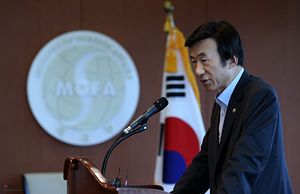For the first time since President Park Geun-hye took office in February 2013, South Korea’s foreign minister will visit Japan. The South Korean Ministry of Foreign Affairs (MOFA) announced on Wednesday that “Foreign Minister Yun Byung-se will visit Japan on June 21-22 to attend a reception marking the 50th anniversary of the normalization of the ROK-Japan relations… and meet with his Japanese counterpart Fumio Kishida.”
Japan-South Korea ties have been frosty for the past two years, with historical divisions and a territorial dispute driving a wedge between the two Northeast Asian neighbors. The relationship has been inching forward in past months, both on the bilateral level and trilaterally with China. Japan and South Korea restarted the “two-plus-two” dialogue between their foreign and defense ministers in April, after a five-year hiatus. China, Japan, and South Korea restarted their trilateral foreign ministers’ meeting in late March, raising hopes for a possible summit among the three countries’ leaders.
This year is a particularly interesting time for Japan-South Korea relations – it marks not only the 70th anniversary of the end of World War II (and Japanese colonial rule of Korea) but the 50th anniversary of the establishment of diplomatic ties between Japan and South Korea, which were formalized on June 22, 1965. That the former anniversary has received far more attention than the latter speaks volumes about the current state of the relationship. There were concerns in the United States, which counts Japan and South Korea as its most important Asian allies, that the June 22 anniversary would go mostly unmarked.
The recent announcement allays those concerns. In addition to a commemorative banquet to be held in Tokyo on June 22, which Yun will attend, South Korea will also host an international academic conference from June 17-19 dedicated to the topic “beyond the past and into the future of the ROK-Japan relations.”
Yun’s visit to Tokyo will also touch on modern-day issues, of course. The MOFA statement said that Yun and Kishida would “exchange views on issues of mutual concern, including the ROK-Japan relations and North Korea.” Seoul has stated numerous times in recent months that it will seek defense and security cooperation with Japan despite lingering tensions over historical issues.
But even on hot button historical issues, there is hope for a breakthrough. South Korean officials have been speaking recently about bilateral progress on the controversial issue of “comfort women,” the euphemistic name for women coerced into sexually servicing Japanese troops during World War II. In an interview with the Washington Post on June 11, Park said, “There has been considerable progress on the issue of the comfort women, and we are in the final stage of our negotiations.” South Korean Foreign Minister Yun Byung-se made a similar comment in Washington D.C., noting that “the ROK and Japan seem to be clearly committed to resolving this issue.”
Speaking to the Washington Post, Park that South Korea and Japan “can expect to look forward to a very meaningful 50th anniversary of the normalization of our diplomatic ties.” Yun’s upcoming trip is a big step in that direction.
































